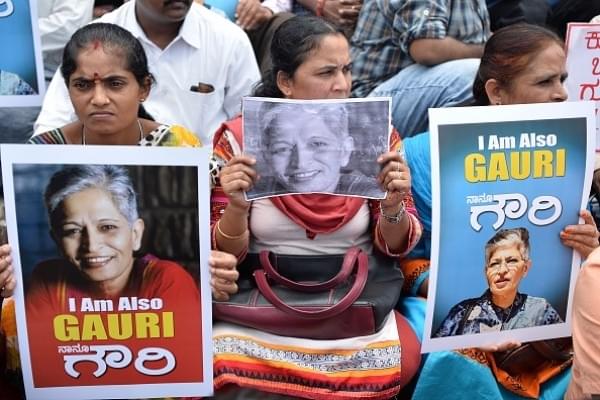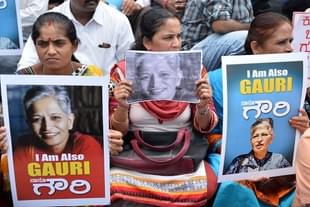Ideas
Death Doesn’t Recognise Political Ideology, Nor Should We
Mayuresh Didolkar
Sep 07, 2017, 06:22 PM | Updated 06:22 PM IST
Save & read from anywhere!
Bookmark stories for easy access on any device or the Swarajya app.


Yesterday (6 September), senior journalist and activist Gauri Lankesh was shot dead by unknown assailants just outside her residence in the capital of the Congress party-led Karnataka. Understandably, the murder of a public figure in the heart of the capital sent shock waves running through the city and, by night, social media was abuzz with the usual blame games, insinuations and accusations.
As an ordinary citizen, the breakdown of law and order ought to be the primary concern for all of us, and for that, a critical examination of the event and some of the stakeholders is important.
In the past, the mainstream media has often been accused of contextualising crimes based on the party in power. Even after taking the confirmation bias of the accusers into account, there is a grain of truth in this accusation. So while the lynching of a man in Samajwadi Party-led Uttar Pradesh was largely projected as a fringe Hindutva hate crime, similar crimes in the Bharatiya Janata Party-led states have been projected as a failure of law and order and governance. It is time for the mainstream media to consistently hold the Congress government’s feet to fire over this breakdown of law and order in their state. Any attempt of the media to project Lankesh’s murder as a hate crime committed by the right wing, will be considered, correctly, as covering fire given to a government with which the media is somewhat friendly.
As Bill Crawford once said, “Things that matter most must never be at the mercy of things that matter least.” In this context, there is no doubt that the state government has completely lost focus of the things they were elected to do. From the chaos in Bengaluru after a single night of rain and the hacking of Rashtriya Swayamsevak Sangh (RSS) workers to the murder of an Indian Police Service officer and yesterday’s killing, the Congress government has shown its ineptness at handling infrastructure and law-and-order-related issues. With the murders of Narendra Dabholkar during the Congress rule in Maharashtra, and that of M M Kalburgi and now Lankesh in Karnataka, the Congress party too needs to introspect and fix their inability to enforce law and order at the state level. Sadly, rather than working on this problem, Siddaramaiah and his team are focused on identity politics issues like removing Hindi-language signboards from metro stations and opening canteens named after the late prime minister Indira Gandhi. It is high time the Karnataka Chief Minister is made to realise that as long as citizens are getting gunned down in broad daylight, nobody cares what language the signboards use.
If the chatter on social media was anything to go by, this murder, like most of the other issues of our times, is likely to become a victim of the post-truth age, where everyone’s ideological belief dictates the interpretation of events. This must stop. In this, the liberal elites have failed our society. Ramachandra Guha’s immediate indictment of Hindu extremism for this murder stands for everything that is wrong with our discourse today. With the police barely out of the gates on the investigation, and the Home Minister of the state admitting the possibility of a Maoist link to the killing, it is shockingly irresponsible for someone of Guha’s stature to fix responsibility without evidence. It is important to remember that from American civil rights leader Malcolm X to Indian labour union leader Datta Samant, the fringe left has a long history of turning on one of their own, and only the official investigators can tell us which direction this despicable attack came from.
The television news channels with their prime-time scream fests also have some responsibility to shoulder. For once, it would be nice if one of those channels invited a retired police investigator on one of their debates instead of having the same set of panellists dissect everything from the Ram Janmabhoomi issue to marital rape and from Rohingya refugees to the rise of intolerance.
Let there be no debate on the fact that the condemnation of violence needs to be absolute and consistent. Currently, there is a difference in the levels of outrage when the victim is a journalist and when the victim is, say, an ordinary RSS worker in Karnataka or Kerala. Even among the journalist fraternity, the murders of regional-language journalists working in the smaller towns and cities barely find a mention as a footnote, as against the full-scale outrage of the kind Lankesh’s assassination has evoked. Apart from the underlying moral inconsistency, this is also driving a subtle wedge between the rural and urban areas as well as the elites and common citizens. Our already-fractured society can do without more divisions on the lines of haves and have nots.
In Frederick Forsyth’s The Day of the Jackal, the investigating officer asserts that an assassin is an outlaw of the world; that is, countries would help track one down irrespective of their political equations with each other. Sadly, this is no longer applicable in real life today. There have just been too many justifications of violence made by too many public figures. And without scoring political points, this writer can safely assert that while the exercise of intellectualising violence is still in the fringe of the right, the left has already mainstreamed it. It is ironic that Jawaharlal Nehru University student Umar Khalid, whom Lankesh referred to as one of her sons, had written a eulogy for the death of a violent religious extremist like Burhan Wani. It is time all of us draw the lines on the basis of law-abiding against law-breaking instead of on the basis of political ideology.
This writer would like to close with a critical look at two sections on the right in this issue. I saw some images of Lankesh with Jawaharlal Nehru University Students’ Union leaders Kanhaiya Kumar and Khalid circulating on WhatsApp as well as a reminder of the jail sentence she was given in a defamation case. In any case, the company she kept and the law she might have broken have very little relevance on the issue at hand – her violent death. There were also some (mostly on the fringe right, nameless, faceless trolls on social media) who actually celebrated her death. This is despicable, to say the least. A big part of the left losing the discourse in India today has to do with their differentiation between good and bad violence; the right must guard itself against committing a similar mistake.
Lankesh had asked historian and author Vikram Sampath not to play victim when he was forced to step down as the director of the Bangalore Literature Festival and yet yesterday, Sampath was among the first ones to condemn her murder vociferously and without qualifications.
His is an excellent example to follow in these tough times.
The writer is a investment services professional and novelist. His latest novel The Dark Road was published by Juggernaut Publications.





